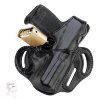We already have a crash ax in every cockpit, in addition to the halon, O2 bottle, pbe, goggles etc which we glance at during the preflight.
If we tell a TSA agent about the ax, most give me a blank stare, or are skeptical.
During FFDO tng near Albuquerque, the per diem doesn't quite cover all of the expenses involved by guys who have done the program, and it is on their days off.
An FFDO had his HK in a "crash pad" near ATL Airport (Eastpoint), and when a guy kicked in a door late at night, the intruder was killed.
An LEO in College Park told me this outside Ruby Tuesday's on Thursday night.


